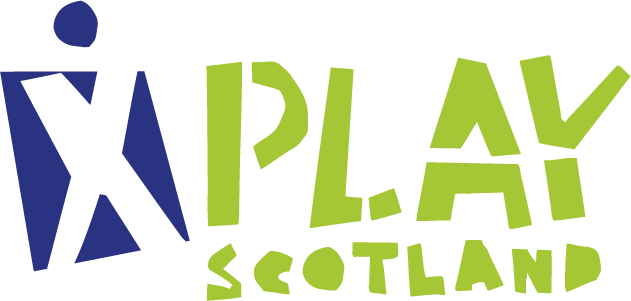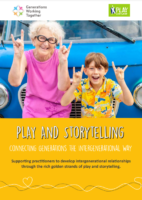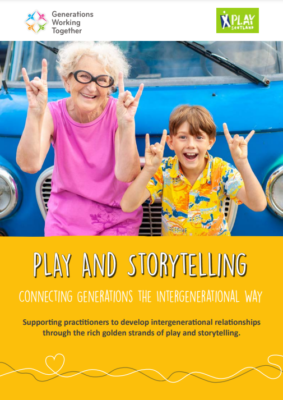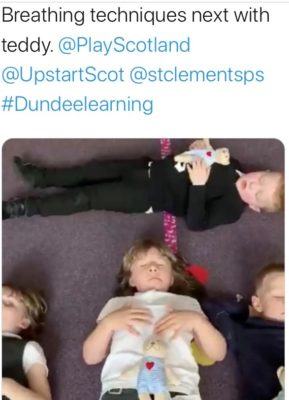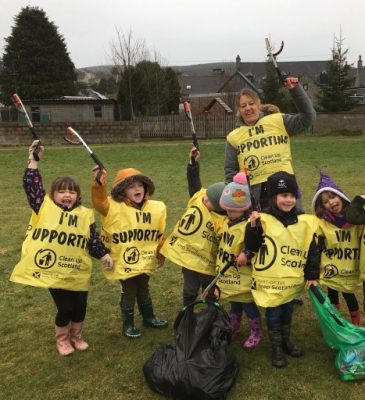At Play Scotland we are interested in piloting innovative ideas and using the findings to further promote play and best practice.
Find out about some of the projects we have been involved in below.
Playworkers Do Playwork
If you look up ‘firefighter’ you will find it in every dictionary. The same as doctor, teacher, and lawyer. But if you look up Playworker what do you find?
We ran a social media campaign to celebrate playwork as a profession and to highlight its significance in promoting children’s development, wellbeing, and the importance of play.
Although we have not yet succeeded in having ‘Playwork’ and ‘Playworker’ added to the Cambridge dictionary, we raised awareness of the amazing work that playworkers do and how they enrich children’s lives and empower children worldwide.
Intergenerational Play and Storytelling
In 2021, we were delighted to receive Scottish Government Get Into Summer Funding to partner with Generations Working Together to run this pilot project to connect children and older people through stories and play in order to tackle the isolation caused by the pandemic.
We ran pilots across 7 care homes and 10 settings for children and young people.
Based on working with these settings and gathering case studies we produced a resource to support intergenerational play and storytelling. We launched the resource on the 29th of April 2022 as part of Global Intergenerational week.
Find out more about planning your own Intergenerational Play Project
Better Breaktimes, Better Transitions
In 2021 we were commissioned and funded by the Scottish Government Get into Summer funding to work with Learning through Landscapes to deliver this project to 8 secondary schools across the Falkirk Council region.
The project aimed to improve breaktime experiences and understand how play can support a positive transition from primary to secondary education. We found that better outdoor and play provision improves children’s mental and physical wellbeing, as well as in their engagement with breaktime activity and formal learning.
Moths to a Flame
In the run up to the COP26 Conference in Glasgow, we delivered the Moths to a Flame project in Scotland to help children and young people engage with the conference. We hosted workshops that involved setting up a moth trap, identifying moths, and creating recycled art of moths to be displayed at the Glasgow Botanic Gardens during the conference.
Play Sufficiency, Open Space Strategies and NPF4 Consultations
In 2022, the Scottish Government launched a consultation on Play Sufficiency Assessments, Open Space Strategies and the National Planning Framework 4.
Play Scotland partnered with A Place in Childhood to ensure that the voices of children and young people were heard in this consultation.
What we did
- Worked with the Scottish Government to produce a child-friendly version of the consultation.
- Produced a podcast on engaging with children and young people on their local spaces. Listen to the podcast here.
- Created a short film explaining what open space strategies and play sufficiency are and how to get involved.
- Created consultation packs for groups that explained clearly how to run a successful engagement.
- Created a straightforward survey for individuals to use if they were not part of a group consultation.
- Worked with Generations Working Together and YWCA to access their networks.
- Worked with Scrap Antics to respond to the consultation with a public art installation.
Find out more about Play Sufficiency Assessments.
The Playwell Project
The Play Well project aimed to investigate how parents and carers might be supported to help their child’s health, wellbeing and learning through play. It was recognised that the children starting or returning to early stages primary in 2020 would have had little or no transition support due to the pandemic and a focus on the development of social and emotional skills would be needed.
We worked with p1 classes in 9 Primary schools in Dundee to improve health and wellbeing (social and emotional wellbeing). We created a play based resource for teachers to support learning across school and home learning.
We worked with a second-year Educational Psychologist Trainee student to evaluate the project using Educations Scotland’s HGIOS4 – Family Learning Challenge Questions.
11 Cards were developed and can be found below. The cards had either a series of emojis or a palette of colours on the other side of the activity. This was to allow class teachers and parents/carers to engage with children in discussions about emotions in an open and non-prescriptive way.
